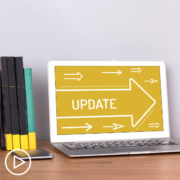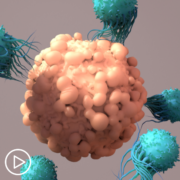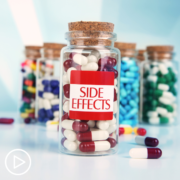What Are the Risks of CAR T-Cell Therapy?
What Are the Risks of CAR T-Cell Therapy? from Patient Empowerment Network on Vimeo.
Dr. Melissa Alsina, a myeloma expert from Moffitt Cancer Center, reviews the potential side effects of CAR T-cell therapy for myeloma patients, and discusses how these side effects may be managed.
Dr. Melissa Alsina is an associate professor of medicine in the Blood and Marrow Transplant Program at Moffitt Cancer Center in Tampa, Florida where she also serves as head of the Multiple Myeloma Transplant Program. Learn more about Dr. Alsina, here.
See More from Innovative Myeloma Therapies
Related Resources:

|

How Is CAR T-Cell Therapy Changing the Myeloma Treatment Landscape? |

|
Transcript:
Katherine:
What are the risks of CAR T-cell therapy?
Dr. Alsina:
So, in myeloma, it is, in general, pretty safe. There are two main – well, actually, I would say three main side effects that we can see with CAR-T. Number one is called cytokine release syndrome, and we are getting these cells from the patient’s immune systems, sending them a lab to be manufactured so that they can recognize this protein, BCMA, in the myeloma cells.
And then, those cells are grown, so essentially, what we’re doing is that we’re taking the immune system of the patient, and we’re making it very specific against the myeloma cell. And then we’re growing it, so we’re making a hyperactive immune system, and then giving it back to the patient. And then, those cells, they are going to go ahead and react against the myeloma cells and start killing the myeloma cells, and in doing that, that reaction, that immune reaction will elicit release of a lot of proteins – cytokines – and that can cause side effects.
When that happens, that is called cytokine release syndrome, and the most common finding with that is a fever. Patients can have a high fever. And then, it varies depending on the CAR-T that the patients are getting. So, for example, with this Abecma, usually, the reaction happens right away after you get the cells – the next day, so that’s why these patients, we admit them to the hospital because we know that this cytokine release syndrome is going to happen right away.
And, it could be just a fever. In the majority of the patients, it happens like this, is just a fever, but it may be about 20 percent of the patients, that reaction can be more severe, and it could be a fever with low blood pressure or shortness of breath, and it could be a fatal complication, but that’s very, very rare.
And we know – we can identify, obviously, when it’s happening, and there’s a medication that we can give to actually sort of counteract that reaction and don’t let it progress, and in the majority of the patients, that works quite well.
Katherine:
What other side effects are there for CAR T-cell therapy?
Dr. Alsina:
Yeah, so besides the main one that I discussed, cytokine release syndrome, the other thing that could happen is neurotoxicity, meaning that T cells can actually cross to the brain and cause toxicity in the brain, and depending on the type of CAR-T that the patient is getting, it could be less or more risk.
But essentially, what could happen is that the patient could have some aphasia, like for example, difficulty finding words. It could also be just a headache. Patients could have seizures, so we do give the patients medication to prevent seizures while they are undergoing CAR-T.
They can have difficulty writing, so we make every patient write a sentence every day to make sure that’s not being affected. And we do a mini mental status every day. Every day, we’ll go see the patient and ask them 10 different questions, like “Where are you? What day is it? Who’s the president?”, we show them an object, and so on so we can monitor these things very closely. If we see any changes, then we can intervene. Usually, for neurotoxicity, we give steroids.
The good news, though, is that this is very rare. With Abecma, it’s very rare that a patient would have severe neurotoxicity. With ciltacabtagene autoleucel (Carvykti), which is the one that was approved more recently, from 100 patients that were treated, there were five patients that had this delayed neurotoxicity, some of them with movement disorders, like Parkinson’s-like systems, and these were delayed. These didn’t happen in the first few weeks.
But we learned what are the risks associated with these, the majority of the patients that have very high tumor burden, so what we do is that we monitor the patients very closely, especially the patients with high tumor burden. The ideal situation is that we can control the disease a little bit better before taking them to CAR-T, but even when that’s not possible, what we do is that we intervene early on if we see that these patients are getting any side effects and being more aggressive with the intervention.
And then, the third, more important side effect is these CAR-T cells can prevent blood counts to recover. For CAR-T, we give chemotherapy.
That would allow the T cells to expand, and this chemotherapy can drop the blood counts, but usually, they recover quickly, but in some patients, this recovery doesn’t happen quickly, and patients can have low counts for months, and obviously, that would bring increased risk of infection.
So, that is a potential complication, especially in patients that have received a lot of prior therapies, and it’s not common that a patient would take a long time, but it could happen, and sometimes, occasionally, we’ve had to give these patients a stem cell boost from stem cells that we have stored to actually make their counts recover. So, those are essentially the three most common complications, but in general, it’s a treatment that is well tolerated and very manageable, and I can tell you the majority of the patients that I’ve treated, they’ve said this is easier than a transplant.



